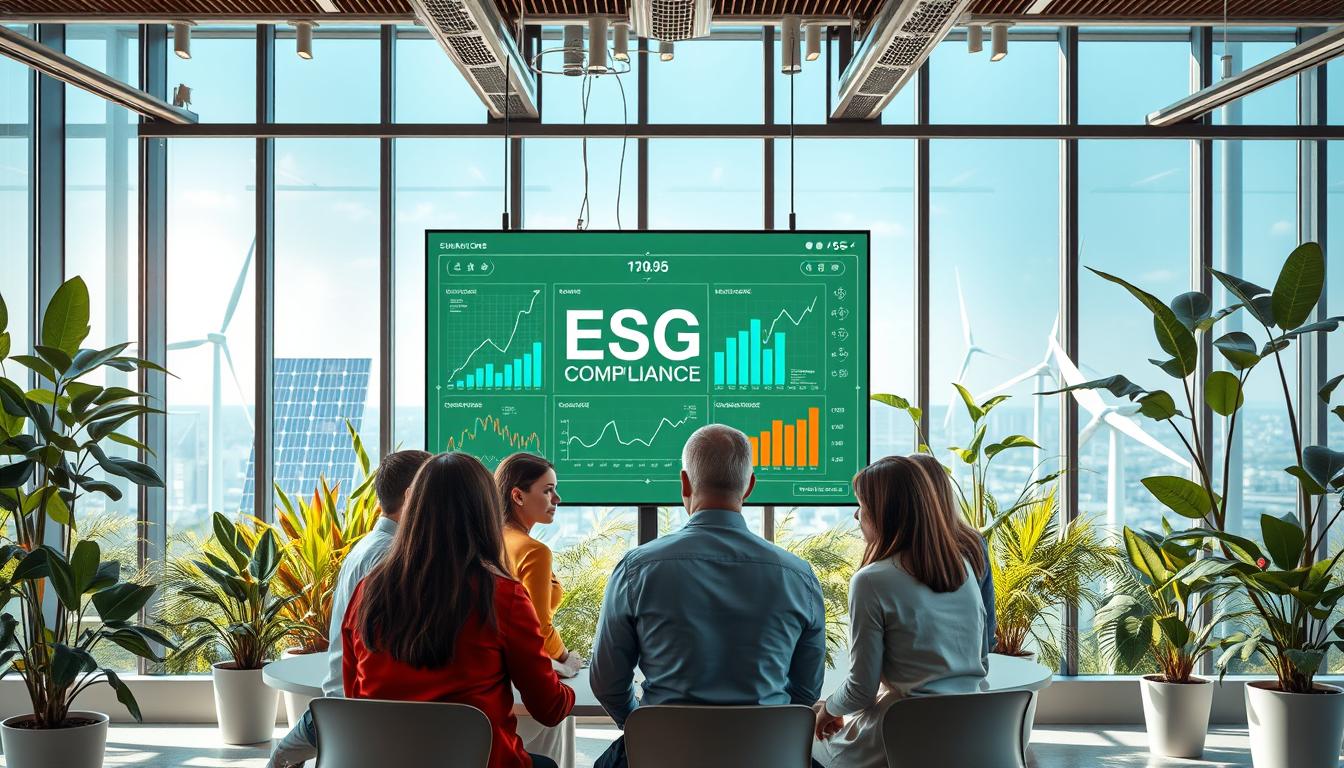Last Updated on December 9, 2025
The evolution of software as a service (SaaS) has brought ESG compliance to the forefront. Adopting sustainable practices is now a must for staying ahead. ESG, covering environmental, social, and governance aspects, is being woven into cloud solutions. These tools automate reporting, offer advanced analytics, and monitor ESG metrics in real-time. This integration not only ensures compliance but also fosters innovation and ethical business practices.
ESG SaaS platforms are revolutionizing how companies operate by collecting and analyzing vast data. This transformation enables businesses to measure their performance against set standards with ease. With the right technology, you can enhance operational efficiency, track environmental effects, and lead in sustainability. Moreover, embracing ESG compliance attracts investors who value businesses making a positive social and environmental impact.
Key Takeaways
- ESG compliance is crucial for competitive advantage in the SaaS industry.
- Advanced data analytics help assess ESG performance effectively.
- Automation of ESG reporting saves time and improves accuracy.
- Investment in ESG-focused digital platforms is essential for innovation.
- Embracing sustainability attracts socially conscious investors.
- Challenges include data security and integration with existing systems.
Introduction to ESG Compliance and SaaS
In today’s corporate world, understanding ESG compliance is crucial. It involves environmental, social, and governance responsibility, ensuring businesses are accountable for their societal and environmental impact. With the advent of Software as a Service (SaaS), companies can now manage these responsibilities more efficiently. Integrating ESG compliance into your strategy can boost transparency and efficiency in sustainable practices.
SaaS solutions enable real-time data analysis and reporting, vital for tracking sustainability goals. Over 90% of companies in the S&P 500 and Russell 1000 now publish annual sustainability reports. This trend shows a growing awareness of ESG compliance’s importance.
A Deloitte survey found that 60% of senior executives report moderate progress toward sustainability goals, while 25% see significant advancements. Setting up cross-functional ESG councils, a strategy adopted by 52% of respondents, highlights the value organizations place on these initiatives. Cloud-based software simplifies ESG compliance management, making it easier to meet various regulatory demands.
As the push for sustainable investments grows, ESG compliance can be a key differentiator. Investors increasingly look for companies that show environmental and social responsibility. The U.S. SIF Foundation reports that $8.4 trillion in assets are managed with ESG principles, accounting for 12.6% of all investment assets. Meeting these expectations not only benefits the environment but also enhances your organization’s reputation and investor appeal.

The Importance of ESG in Today’s Business Landscape
In today’s competitive market, ESG principles have become crucial, shaping modern business strategies and decision-making. Stakeholders now demand transparency and accountability, pushing companies to adopt strong frameworks. These frameworks focus on corporate sustainability and ethical practices.
Investors are key players, with a growing trend towards sustainable and responsible investment (SRI) strategies. A significant percentage of business leaders—75%—now see ESG criteria as essential to their strategy. This shift highlights the importance of stakeholder engagement in attracting customers and investors.
Regulatory pressures also underscore ESG’s importance. Governments are enforcing stricter ESG reporting requirements, like the U.S. SEC’s proposed climate disclosure rules. This forces companies to prioritize transparency and ethical conduct. Integrating ESG practices boosts corporate reputation and helps mitigate risks from climate change, supply chain disruptions, and social unrest.
Companies leading in ESG initiatives are seen as committed to ethical practices, building lasting trust with consumers and stakeholders. They are better equipped to thrive in evolving business environments. By proactively managing ESG risks, they position themselves to seize emerging opportunities. Thus, engaging in ESG assurance not only meets regulatory standards but also attracts investors, driving success.
Defining ESG SaaS Business Strategies
Understanding ESG SaaS business strategies is crucial for any organization aiming to succeed today. These strategies boost corporate performance and show a commitment to ethics and sustainability. They involve various components that are key to shaping these strategies.
What constitutes ESG SaaS Business Strategies?
Effective ESG SaaS business strategies include adopting several ESG SaaS frameworks. These frameworks help assess and track important sustainability metrics. They guide organizations in adopting eco-friendly practices that meet stakeholder expectations. For example, companies are now focusing on:
- Utilizing advanced analytics to gain insights into environmental performance, aiding in better decision-making.
- Implementing sustainability metrics to benchmark and enhance operational efficiency, reducing the carbon footprint.
- Integrating eco-friendly practices into daily operations, creating a culture that values sustainability.
- Promoting corporate ethics through transparent ESG performance reporting, building trust with investors and customers.
By adopting these strategies, your organization can not only meet emerging regulations but also access new funding opportunities. Knowing that 83% of consumers expect companies to prioritize ESG will encourage you to align your business practices. With the right ESG SaaS solutions, your organization can be a leader in creating a sustainable future.
Technological Innovations in ESG Compliance
Technological advancements have revolutionized ESG compliance, turning it into a streamlined, data-driven process. ESG software solutions are key, helping organizations tackle compliance complexities while boosting sustainability.
Data analytics is essential for managing ESG data. Companies use advanced analytics to set goals and track their achievements. With growing regulatory demands, the need for accurate, timely data is more critical than ever. ESG SaaS solutions help track key metrics, offering insights for compliance and transparency.
The integration of artificial intelligence in ESG brings significant improvements. AI platforms analyze large datasets, spotting trends and risks. These tools are crucial for developing strategies that meet changing regulations. They enable scenario analysis and benchmarking, helping companies compare and improve.
As regulations like the European Union’s Sustainable Finance Disclosure Regulation (SFDR) and the Task Force on Climate-related Financial Disclosures (TCFD) evolve, organizations must adapt quickly. Regulatory technology is vital for keeping up with new rules, reducing non-compliance risks.
It’s crucial for tech experts and ESG professionals to work together effectively. Industry leaders push for advanced solutions that simplify ESG data management. This makes reporting clearer and decision-making more informed. As the ESG landscape evolves, embracing these technologies will be key for success.
Environmental Impact of ESG SaaS Solutions
ESG SaaS solutions are crucial in tackling environmental issues for today’s businesses. They enable companies to manage data sustainably, reducing their carbon footprint and boosting resource efficiency. These advancements help meet regulatory needs and support global sustainability efforts.
Reducing Carbon Footprint
Green tech solutions empower businesses to track and control their emissions. This includes:
- Real-time monitoring of energy use to spot inefficiencies.
- Integrating carbon reduction strategies into daily operations.
- Setting specific targets for emissions cuts.
By integrating these strategies, companies can directly support the UN’s Sustainable Development Goals. This blend of profit and environmental care boosts stakeholder confidence.
Resource Efficiency
Energy efficiency is a key focus in ESG SaaS solutions. Companies gain from:
- Optimized data centers that cut down on resource use and promote green coding.
- Teamwork across departments to ensure ESG is considered throughout the product’s life cycle.
- Clear transparency in resource management, fostering trust with users.
Investing in sustainability leads to long-term cost savings and aligns corporate strategies with market needs. Companies focusing on these areas are set to excel in an eco-aware market.

Social Contributions Through ESG Compliance
Integrating social contributions into corporate culture is more than just ethical governance; it boosts employee engagement. In 2024, the SaaS sector is placing a strong emphasis on diversity, equity, and inclusion (DEI). These efforts not only show a commitment to corporate social responsibility but also create an environment where everyone feels valued and empowered.
Diversity and Inclusion Initiatives
Organizations are now embedding diversity and inclusion into their operations. These initiatives bring about substantial benefits:
- Enhanced Team Performance: Diverse teams are more innovative and creative, leading to better performance.
- Improved Employee Engagement: An inclusive environment boosts job satisfaction and keeps staff longer.
- Greater Attractiveness to Talent: Companies that prioritize ethical governance attract diverse talent who share these values.
Community Engagement
Being active in community programs shows a firm’s dedication to corporate social responsibility. Companies can participate in several ways, such as:
- Investment in Local Initiatives: Supporting local charities strengthens community bonds.
- Encouraging Employee Volunteering: Offering volunteer opportunities boosts employee engagement and fosters a positive culture.
- Social Impact Measurement: Companies that measure their social impact can clearly communicate their contributions to the community.

Governance Improvements in SaaS Companies
In the evolving landscape of Software as a Service (SaaS), establishing strong governance frameworks is crucial. Businesses now understand the importance of ethical behavior and transparency in building stakeholder trust. By adopting comprehensive governance frameworks, companies can efficiently track compliance, ensuring they meet legal standards.
Preparing for a complex regulatory environment demands a focus on accountability. Firms that prioritize governance improvements not only reduce risks but also boost their public image. Effective governance is marked by a commitment to ethical behavior, leading to positive interactions with stakeholders and clients. With the SaaS market expected to hit $908.21 billion by 2030, these efforts are more critical than ever.
Investing in governance initiatives boosts a firm’s resilience. Companies using compliance tracking tools can manage potential issues proactively. This fosters a culture of responsibility and reliability, laying the groundwork for sustainable growth and improved business performance.
- Enhanced transparency strengthens stakeholder relations.
- Robust compliance tracking supports adherence to global regulations.
- Ethical behavior promotes trust among employees and clients.
As SaaS companies grow, the move towards more responsible governance is evident. This shift not only prepares firms for regulatory scrutiny but also enhances their market standing. These qualities are particularly appealing to younger workforce demographics, who value companies that prioritize sustainability and transparency. Thus, governance frameworks are essential in the competitive SaaS sector.
How ESG SaaS Companies Drive Positive Change
ESG SaaS companies are crucial in driving positive change across various industries. They implement innovative solutions that boost operational efficiency and contribute to social responsibility. Companies are now adopting corporate benchmarks that align with sustainable practices, staying competitive in the market.
Real-World Examples of ESG Integration
Many organizations showcase successful ESG integration. Salesforce, for example, uses data-driven insights to enhance sustainability efforts and engage stakeholders. By using sustainable finance software, these companies demonstrate accountability in their operations. Retail giants have also improved labor transparency, leading to better working conditions and higher employee satisfaction.
This commitment to sustainable practices positions them as leaders in corporate responsibility.
Measuring Social Impact
Measuring your company’s social impact is crucial when adopting ESG performance metrics. Businesses face pressure from employees, investors, and partners for transparency in ESG reporting. Tools like Net Zero Cloud automate reporting, ensuring compliance with global standards. Failure to comply can result in financial penalties and damage to reputation.
Impact investing is changing how organizations identify growth and risk management opportunities. Sustainability-driven innovation leads to new products and services, capitalizing on the circular economy’s growth potential. By setting ambitious ESG objectives, companies can align strategies for diverse user bases. This fosters a purpose-driven workplace that attracts and retains talent committed to corporate values.
Conclusion
The shift in SaaS business strategies towards ESG compliance marks a significant milestone. Reflecting on sustainability in SaaS, it’s evident that integrating ethical governance, environmental stewardship, and social responsibility is crucial. With 70% of consumers and businesses seeking sustainable partners, aligning your strategy with this trend is vital for staying competitive.
The future of ESG compliance looks promising, offering both opportunities and challenges. Companies like Microsoft and Salesforce exemplify corporate responsibility, showing how proactive ESG strategies build trust and boost financial performance. In fact, those with strong ESG frameworks often outperform others, highlighting the strategic benefits of such investments.
As the SaaS market grows, reaching an estimated $908.21 billion by 2030, social and governance factors will become even more critical. Committing to ESG compliance now sets your enterprise up for long-term success. It also secures the loyalty of a values-driven workforce and prepares for future regulations. Prioritizing sustainability ensures your leadership in the market for years to come.








